|
|
|
Sort Order |
|
|
|
Items / Page
|
|
|
|
|
|
|
| Srl | Item |
| 1 |
ID:
190052
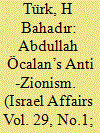

|
|
|
|
|
| Summary/Abstract |
Anti-Zionism has been a salient component of rightwing and leftwing movements in Turkey. The Kurdistan Workers’ Party (Partiya Karkerên Kurdistan, PKK) that took its cue from the Turkish Left has become a topic of discussion since its founding in 1978. Yet little effort has been devoted to analysing the political thought of the PKK’s leader, Abdullah Öcalan. Using an interpretative-textual method, this article seeks to fill this lacuna by discussing the role of anti-Zionism in Öcalan’s thought.
|
|
|
|
|
|
|
|
|
|
|
|
|
|
|
|
| 2 |
ID:
190047
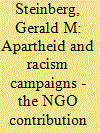

|
|
|
|
|
| Summary/Abstract |
Under the headings of promoting human rights and international law, the influential network of non-governmental organisations (NGOs) has been a central actor in the political war targeting Israel though allegations of apartheid and racism. In applying these slanders, the NGOs systematically erase the history of the Arab-Israeli conflict, including decades of warfare and terrorism, and join in the attempt to delegitimize the nation-state of the Jewish people, regardless of borders, and as distinct from criticism of Israeli policies regarding territory occupied in the 1967 war. This process constitutes the essence of post-Holocaust or ‘new antisemitism’, as included in the consensus working definition published by the International Holocaust Remembrance Alliance. The NGO campaigns are constructed on the foundations established by the Soviet and Islamic blocs culminating in the 1975 UN ‘Zionism is racism’ resolution. This theme was revived in the NGO Forum of the 2001 Durban Conference, led by Human Rights Watch, Amnesty International, and Palestinian groups such as Al-Haq, and used to justify appropriating the methods of the South African anti-apartheid campaign, including boycotts and lawfare. After the Durban conference and for 20 years since, this NGO network continued and expanded the campaign based on the apartheid and racism allegations. Their claims were amplified in media platforms, international bodies, anti-Israel church groups and on university campuses in the form of ‘Israel apartheid weeks’. European governments enabled activities of the Palestinian and Israeli NGOs through substantial funding, estimated at 120 million Euros annually. In 2020 and 2021, the NGO emphasis on these themes increased, led by HRW, and supporting the decision of the ICC prosecutor to accept jurisdiction over Palestinian claims and to open investigations against Israel. This context amplified the potency of the allegations of apartheid and racism in attempts to demonise Israel.
|
|
|
|
|
|
|
|
|
|
|
|
|
|
|
|
| 3 |
ID:
190054
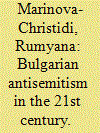

|
|
|
|
|
| Summary/Abstract |
This article examines the conceptual elements of antisemitism in Bulgaria today as well as the ways in which these concepts are communicated linguistically and visually. It seeks to provide an insight into different aspects of antisemitism – from direct manifestations to attempts at rewriting or distorting the history of Bulgaria’s Jewry. The IHRA definition is used for the identification of antisemitic manifestations, from classical stereotypes (power, greed, etc.) to more contemporary attributions (Israel-related antisemitism such as instrumentalisation of the Holocaust, Nazi analogy, denial of Israel’s right to exist).
|
|
|
|
|
|
|
|
|
|
|
|
|
|
|
|
| 4 |
ID:
190044
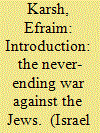

|
|
|
|
|
| Summary/Abstract |
It has been one of Zionism’s foremost credos that so long as Jews continued their millenarian dispersal as small minorities in countless countries around the globe, antisemitism would remain unabated. Only by reinstating the Jewish people as an equal member of the comity of nations through re-establishment of its own independent state in the ancestral homeland would Jews be able to regain normalcy and respectability and to ameliorate, if not eliminate altogether, this long hatred. ‘Every single one of the nations in whose midst Jews live are shamefacedly or brazenly anti-Semitic’, wrote political Zionism’s founding father Theodor Herzl,
|
|
|
|
|
|
|
|
|
|
|
|
|
|
|
|
| 5 |
ID:
190051
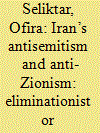

|
|
|
|
|
| Summary/Abstract |
The discussion of Iran’s antisemitism and anti-Zionism has been separated from the debate on the Islamist regime’s nuclear project. A synthesis of the issues is needed given that both are the core of the regime’s foreign policy. Some observers consider the regime’s antisemitism and anti-Zionism – promising Israel’s destruction – to be eliminationist. Most others, however, argue that the rhetoric is performative, designed to bolster the Shiite theocracy in a predominantly Sunni region. While the debate cannot be settled, it is well known that nuclear warfare does not allow for a margin of error in predictions. Should the advocates of performative anti-Zionism be wrong, millions of Jews and others would die.
|
|
|
|
|
|
|
|
|
|
|
|
|
|
|
|
| 6 |
ID:
190049
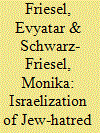

|
|
|
|
|
| Summary/Abstract |
A new wave of antisemitism has lately emerged, mostly directed against the Jewish state of Israel. It justifies itself with a new formulation that obfuscates Jew-hatred and its main bearers are Western left-oriented academics. A worrying fact is the large number of Jewish intellectuals, among them Israelis, who support such positions. This reflects the deepening ideological differences in present-day Jewry with regard to the Jewish state and its characteristics, an issue that is insufficiently addressed.
|
|
|
|
|
|
|
|
|
|
|
|
|
|
|
|
| 7 |
ID:
190045
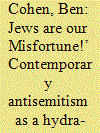

|
|
|
|
|
| Summary/Abstract |
Antisemitism has once again proven itself to be an international phenomenon, crossing borders and cultures with ease and adept at finding major issues in the public square, such as the COVID-19 pandemic, upon which to hang its claims. This article argues that antisemitism currently takes four major forms: Anti-Zionist antisemitism, which targets the State of Israel as a Jewish collectivity; Neo-Traditionalism, which revives pre-modern anti-Judaic notions in contemporary guise; Holocaust relativisation, which involves instrumentalizing and distorting the nature of the Holocaust without denying it outright; and anti-Judaism, which manifests in efforts to ban circumcision, kosher slaughter and other core Jewish rituals. The article concludes by examining whether the International Holocaust Remembrance Alliance (IHRA) Working Definition of Antisemitism is an adequate tool for engaging with a growing problem, suggesting ways in which the definition might be amended to make it more effective.
|
|
|
|
|
|
|
|
|
|
|
|
|
|
|
|
| 8 |
ID:
190048
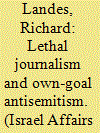

|
|
|
|
|
| Summary/Abstract |
This article examines the close relationship between the consistent practice of lethal journalism (in this case reporting Palestinian war propaganda as news) among Western journalists, and the sudden appearance of the ‘new antisemitism’ at the turn of the last millennium. It looks closely at two cases – the al-Durah ‘murder’ (September 2000) and the Jenin ‘massacre’ (April 2002), and the manner in which this allegedly professional journalism opened the door to a host of postmodern antisemitic themes, from Holocaust inversion to progressive supersessionist projections, and the manner in which Jihadists bent on destroying the West have used through this unacknowledged hostility to Jews – it’s merely criticism of Israel – as the West’s soft underbelly.
|
|
|
|
|
|
|
|
|
|
|
|
|
|
|
|
| 9 |
ID:
190053
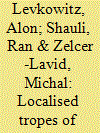

|
|
|
|
|
| Summary/Abstract |
This article focuses on the ways in which concepts and tropes of the Holocaust are used as political instruments in a part of the world that was not immediately affected by its events. It reviews the use of these concepts in selected cases from areas of political conflict in South Korea, Malaysia, and China and compares them with a view to finding a common denominator specific to these Asian countries. The article questions the futility of the current attempt to regulate definitions of antisemitism and its detachment from the realities of politics and academic and public discourse, especially in Asia. Finally, it demonstrates that the semantics of the Holocaust in the selected cases seldom signify anti-Jewish sentiment but are used for other rhetorical and political purposes.
|
|
|
|
|
|
|
|
|
|
|
|
|
|
|
|
| 10 |
ID:
190050
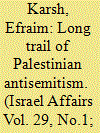

|
|
|
|
|
| Summary/Abstract |
Contrary to the commonly held misconception, Palestinian antisemitism is not a corollary of the Palestinian-Israeli conflict but the other way around: the perpetuation of the conflict is a direct result of the deeply ingrained Palestinian-Arab Jew-hatred and the attendant rejection of any form of Jewish statehood. From the onset of the conflict, a century ago to this day, Palestinian Arabs have been subjected to a sustained hate campaign of racial, religious and political incitement that has portrayed Jews (and Israelis) as the source of all evil, synonyms for iniquity, corruption and decadence, whose clear and present danger to human kind can only be removed through their complete annihilation. Small wonder that not a single Palestinian-Arab leader has ever recognised the millenarian Jewish attachment to the Land of Israel or evinced a true liking for the ‘two-state solution’ since it was first evoked in 1937.
|
|
|
|
|
|
|
|
|
|
|
|
|
|
|
|
| 11 |
ID:
190055


|
|
|
|
|
| Summary/Abstract |
In contrast to the steady increase in discrimination against Jewish and/or Israeli scholarship in Western academic circles over the past decade, supported by traditional antisemitic conspiracy tropes, Chinese academia, encouraged by government support for translation and publication of Israeli literature, has consistently expanded the opportunities for studying Israeli literature. This article analyzes the reception of Jewish and Israeli literature in China today, principally through assessment of the popularity of the writings of Etgar Keret, a contemporary writer well-known for his surrealist and sardonic writing style grounded in the hard realities of daily life in Israel. It will demonstrate a positive approach to contemporary Israeli literature in mainland Chinese universities and assess the reasons for it.
|
|
|
|
|
|
|
|
|
|
|
|
|
|
|
|
| 12 |
ID:
190046
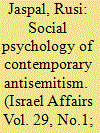

|
|
|
|
|
| Summary/Abstract |
This article focuses upon the social psychological aspects of antisemitism. Empirical research into three forms of antisemitism is reviewed through the lens of social psychological theories of social representation, intergroup relations and identity processes. Across research, perceived threat from Jews and Israel is a recurrent theme. The proposed integrative model suggests that negative social representations of Jews and Israel that accentuate intergroup threat can in turn have implications for identity processes at an individual level, mainly by curtailing feels of self-esteem, self-efficacy, continuity and distinctiveness. Identity threat can lead the individual to react defensively by engaging in antisemitism.
|
|
|
|
|
|
|
|
|
|
|
|
|
|
|
|
|
|
|
|
|